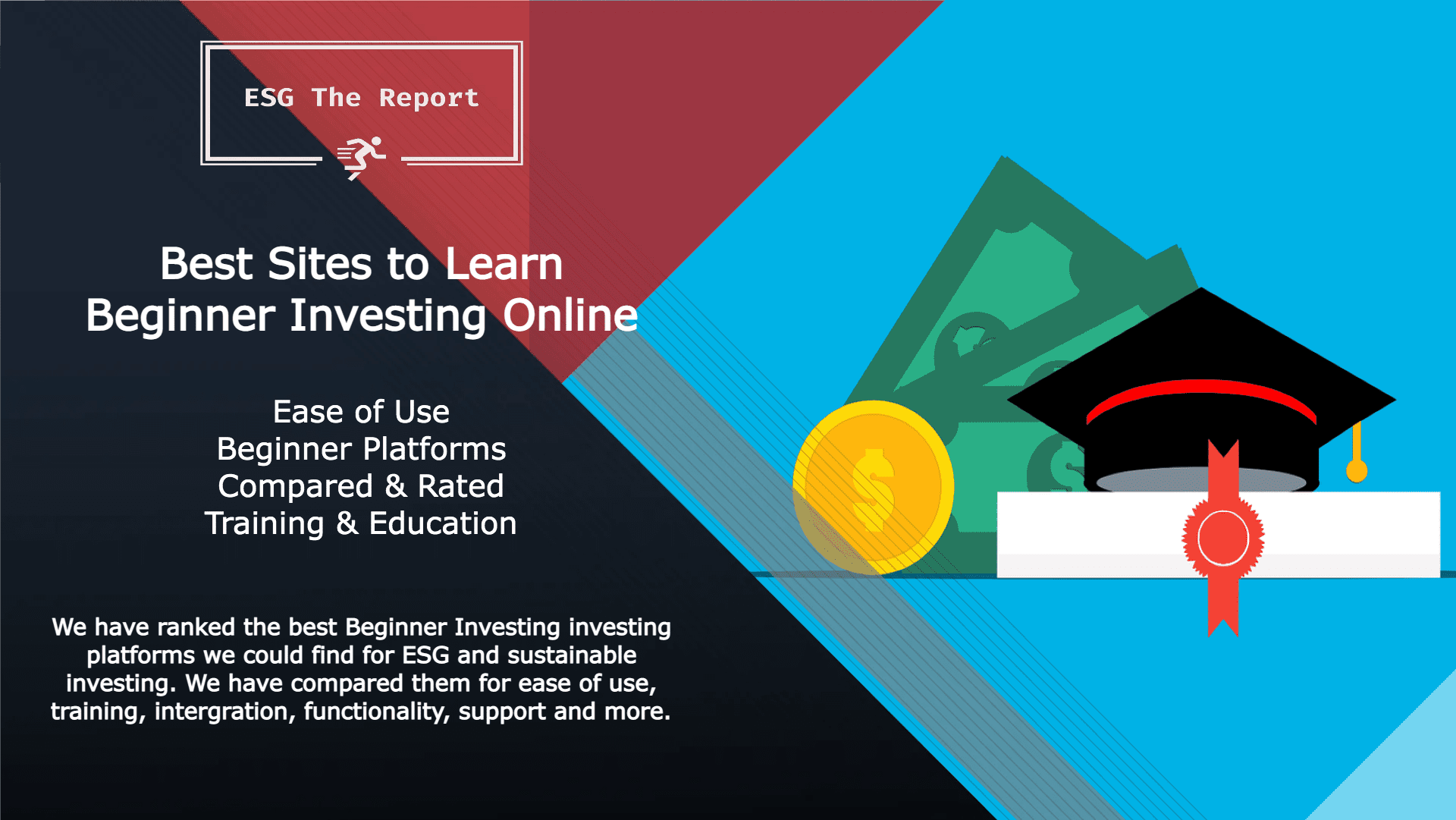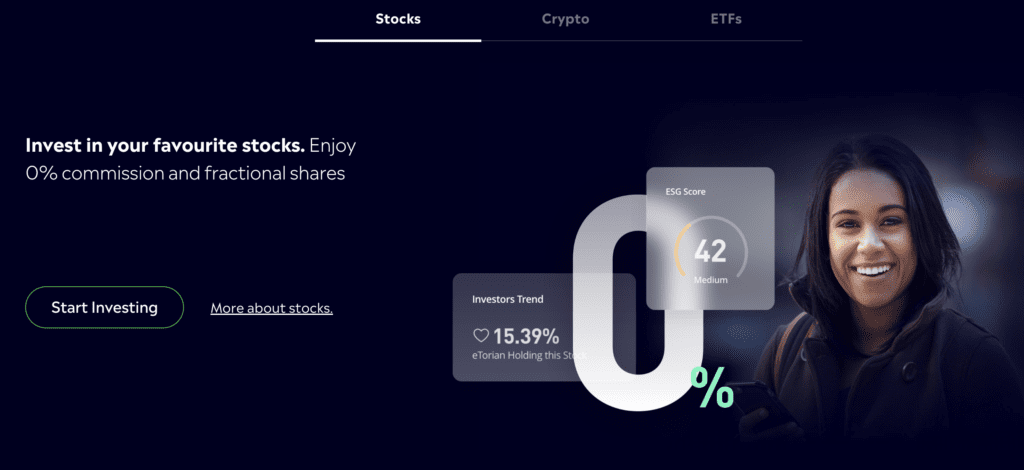Best Sites to Learn Beginner Investing Online
Best Sites to Learn Beginner Investing Online

In order to be successful at sustainable investing, you first need to understand what trading is and how it works. Otherwise, you are going to risk and lose a lot of money in learning the basics. Sustainable investing is the practice of making investments that consider environmental, social, and governance (ESG) factors, but this will be a challenge if you do not understand how the markets work. So, let’s jump in!
*Note: We are always in the process of reviewing different platforms, so don’t hesitate to check back.
Best in Class for Artificial Intelligence and Social Investing
eToro (US Residents Only)
*Note: Although eToro has been helping people be successful in investing in the markets since 2007, it is only recently that US Residents have had access to their platform. Therefore, they have a separate portal for residents of the United States which can be reached HERE.

eToro is a leading AI & Social Trading platform that offers a variety of features to its users including the eToro Academy and Social Investing. Founded in 2007, the platform is easy to use and provides access to a wide range of assets, including forex, stocks, and cryptocurrencies, but has only recently been available to investors in the United States. One of the unique features of eToro is the ability to copy the trade decisions of expert investors. This allows users to receive amazing perks for sharing their expert investing decisions with the community. Hence, the term “social investing”.
(eToro USA LLC does not offer CFDs, only real Crypto assets are available.)
In addition, eToro offers a solid trading experience with a minimum deposit of just $50 USD. It has over 3,056 Tradable symbols that also include CFD Trading, US Stock Trading, International Stock Trading, Social Trading, cryptocurrencies, and a lot more. With a trust score of 93 out of 99, eToro is a reliable platform for investment aficionados of all levels of experience.

Key Features
- Two mobile apps for crypto and money transfers
- The user design makes navigation easy
- Includes a Standard economic calendar
- Includes an Earnings report calendar
- Provides daily market analysis series and podcasts
- Use Artificial Intelligence to Boost your investing
- Easy & Affordable to get started
Pricing
- Fixed 1% fee for buying and selling trades
- Fixed 1% commission for over 200 crypto assets
- Crypto to crypto transfers at only a 0.1% fee
Does eToro offer training?
Yes! eToro has partnered with e-Careers to offer a fully-funded training course about trading in the financial markets.
*Note: Although eToro has been helping people be successful in investing in the markets since 2007, it is only recently that US residents have had access to their platform. Therefore, they have a separate portal for residents of the United States which can be reached HERE.
(eToro USA LLC and eToro USA Securities Inc.; Investing involves risk, including loss of principal; Not a recommendation)
eToro (All other Countries)
(eToro Disclaimer: eToro is a multi-asset platform that offers both investing in stocks and crypto assets, as well as trading
CFDs). Please note that CFDs are complex instruments and come with a high risk of losing money rapidly due to leverage. 76% of retail investor accounts lose money when trading CFDs with this provider. You should consider whether you understand how CFDs work, and whether you can afford to take the high risk of losing your money. Past performance is not an indication of future results. The trading history presented is less than 5 complete years and may not suffice as a basis for investment decisions. Copy Trading does not amount to investment advice. The value of your investments may go up or down. Your capital is at risk. Cryptoasset investing is highly volatile and unregulated in some EU countries. No consumer protection. Tax on profits may apply. eToro USA LLC does not offer CFDs makes no representation and assumes no liability as to the accuracy or completeness of the content of this publication, which has been prepared by our partner utilizing publicly available non-entity-specific information about eToro.
AvaTrade
Rated best overall for beginners Globally, in Canada & the UK
Some of the key features of AvaTrade include its low risk, its trust score of 93, and its minimum deposit of only $100. The company also provides 44 forex options and 1,200+ CFDs with spreads of 0.9 pips for beginners and 0.6 pips for professional traders. AvaTrade is a great choice for those looking for a reliable and user-friendly trading platform.
The global online broker has offices in 11 countries and over 300,000 registered traders. Each month, Avatrade processes over 3 million trades and has a total trade volume of over $1.47 trillion so far. The company offers a variety of trading platforms to suit all traders, including web-based, desktop, and mobile options. In addition, Avatrade provides daily market analysis, video updates, and in-depth courses on forex trading. For beginners, the company offers an extensive education center with 103 articles and 48 videos covering everything from basic to advanced concepts. Overall, AvaTrade is a comprehensive broker that offers a wide range of features and services to its clients.
FAQ: Learn Beginner Investing Online

How do I start learning about investing?
Even a decade ago, the answer to this question would have been much different. Today, there are many resources available to help you get started learning about investing including online courses and websites that can get you started quickly and easily.
Any online broker who is worth their salt will have some form of educational content on their website to help their clients be more successful. Most have an extensive education center with articles, tutorials, webinars, and even in-person events at select locations.
Savvy Investors are also reading…
What is ESG investing?
ESG, or sustainable investing, is a type of responsible investing that focuses on environmental, social, and governance criteria. It’s also sometimes referred to as impact investing or sustainable and responsible investing (SRI).The idea behind ESG investing is that you can make a positive impact on the world while still earning a financial return on your investment. For example, you might invest in a company that is working to reduce its carbon footprint or one that provides training and development opportunities for its employees.
How can I get started with ESG investing?
The first step is to start learning how the markets work. The markets work the same for sustainable investing, but if you do not understand how the overall process functions, then this will increase your risk. The key is to give yourself a foundation of knowledge in the markets and then begin to tailor your portfolio to sustainable investments.
Where should I start as a beginner investor?
There are a few different places that you can start. The most important thing is to educate yourself on the basics of investing. After you have done this, you can begin to look at specific investments.
Some people like to start with stocks, while others prefer mutual funds. If you are starting with stocks, it is important to remember that you are buying a piece of a company. This means that you need to research the company before you invest.
On the other hand, mutual funds are a collection of different investments, so you do not have to worry about researching each individual security. This can make them a good choice for beginners. However, it is important to remember that there are different types of mutual funds and each has its own set of risks and rewards. Once you have a basic understanding of how the markets work, you can begin to look at specific investments.
The most common types of investments are stocks, bonds, mutual funds, and exchange-traded funds (ETFs).
Stocks: When you buy a stock, you are buying a piece of a publicly traded company. stocks tend to be more volatile than other investments, which means they can provide the potential for higher returns but also come with a higher risk of loss.
Bonds: Bonds are debt instruments that are issued by governments and corporations. They tend to be less volatile than stocks, which means they provide a steadier stream of income but typically offer lower returns.
Mutual Funds: Mutual funds are collections of different investments, including stocks, bonds, and cash equivalents. They provide diversification, which can help reduce risk, but they also come with fees and expenses that can eat into returns.
Exchange Traded Funds (ETFs): ETFs are similar to mutual funds in that they are collections of different investments. However, they trade on an exchange like a stock and can be bought and sold throughout the day. ETFs tend to have lower fees and expenses than mutual funds.
How do I start investing with little money?
There are a few different ways to start investing with little money. One option is to open an account with a robo-advisor. Robo-advisors are online investment platforms that offer automated investing services. They can help you build a portfolio of investments without having to put down a lot of money upfront.
Another option is to invest in a mutual fund or ETF through a brokerage account. Brokerage accounts allow you to buy and sell investments online. Some brokerages have no minimum balance requirements, which means you can start investing with very little money.
Finally, you could also consider using dollar-cost averaging. This is a technique where you invest a fixed amount of money into an investment on a regular basis, regardless of the price. over time, this can help you build up a position in an investment without having to put down a lot of money all at once.
There are a few different risks that come with investing. One risk is that your investments could lose value. This can happen if the markets go down or if the specific security you invest in decreases in value. Another risk is that you could end up paying fees and expenses. These are typically deducted from your investment account and can eat into your returns. Finally, there is the risk that you could make bad investment decisions. This can happen if you don’t do your research or if you let your emotions influence your investing.
What are some tips for investing?
Here are a few tips to keep in mind when you’re getting started with investing:
- Start with a small amount of money: You don’t need a lot of money to get started with investing. You can open an account with a small amount of investment.
- Set aside money each month: You can set up a monthly transfer to invest in a mutual fund or ETF. This can help you build up your position over time without having to put down a lot of money all at once.
- Be patient: Don’t expect to get rich quickly from investing. It takes time to see real returns from your investments.
- Choose wisely: Be sure to do your research before you invest in any security. Consider factors such as the company’s financial stability, the risk of loss, and the potential for growth.
- Invest for the long term: Don’t try to time the market. Instead, focus on investing for the long term. This can help you weather the ups and downs of the market and maximize your chances for success.
- Diversify your investments: Diversification is key to successful investing. Don’t put all your eggs in one basket. Instead, spread your investments across different asset classes and sectors to reduce risk.
You’re getting smarter so keep reading with…
What are some common mistakes people make when investing?
One common mistake people make when investing is putting all their money into one stock or security. This is called putting all your eggs in one basket. If that stock or security goes down in value, you could lose all your money. Another common mistake is not diversifying your investments. Diversification is key to successful investing. You should spread your money across different asset classes and sectors to reduce risk. Finally, some people try to time the market by buying and selling stocks based on short-term movements. This is generally not a successful strategy and can lead to losses.
Investing can be a great way to grow your money over time. However, it’s important to understand the risks involved and to make sure you’re investing in a diversified mix of assets. These tips can help you get started on the right foot.
How can I teach myself stocks?
There are a few different ways you can teach yourself stocks. One way is to read books or articles on the subject. Another way is to take an online course. Finally, you could also consider talking to a financial advisor. They can help you understand the basics of investing and offer guidance on how to get started. But with such great risk at stake, the easiest way to learn and gain confidence in the markets is to do Social Trading or Copy Trading where you look over the shoulder of a successful trader and copy their moves.
You’re getting smarter so keep reading with…

AUTHOR BIO
Research & Curation
Dean Emerick is a curator on sustainability issues with ESG The Report, an online resource for SMEs and Investment professionals focusing on ESG principles. Their primary goal is to help middle-market companies automate Impact Reporting with ESG Software. Leveraging the power of AI, machine learning, and AWS to transition to a sustainable business model. Serving clients in the United States, Canada, UK, Europe, and the global community. If you want to get started, don’t forget to Get the Checklist! ✅
